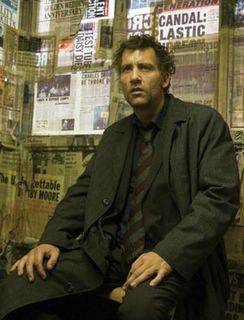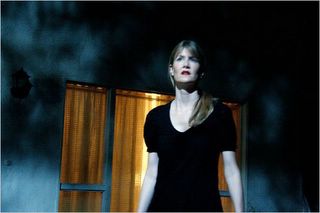I see this list as my attempt at pushback. These are films that I disliked for some specific reason, ones that I have continued to hold in contempt for several months, in most cases. I can't be any more exact because I make an effort to avoid many of the worst films in any given year.
For example, here are some 2006 releases that may very well be among the year's least praiseworthy or significant, but I wouldn't know because they didn't rate 2 hours of my time:
The Nativity Story - Hey, I already know this story! And it doesn't strike me as particularly cinematic. Unless they threw in a couple of camel chases or give the baby Jesus a love interest. (She could be played by Dakota Fanning's creepy
Larry the Cable Guy: Health Inspector - I've spoken to this title's breakdown in logic before. (Is he a cable guy or a health inspector? Doesn't this just highlight the inanity of permanently identifying someone according to his or her profession?) I'm fairly certain this is the most intruiging subject raised by the film.
Grilled - Comic dynamos Kevin James and Ray Romano take a break from boring you with their lame, generic sitcoms to bore you with a lame, generic direct-to-DVD comedy about desperate meat salesmen! It's Glengarry Glen Ross meets...well, something really really stupid about meat.
The Last Kiss - Zach Braff and Paul Haggis join forces to
The Shaggy Dog - Oh, look, that non-charismatic former cokehead turned into a dog. Now he is chasing a cat around. How droll...
Barnyard - Steve Oedekerk, the idiot man-child behind those retarded Thumb shorts and Kung Pow: Enter the Fist, helms 2006's 500,000,022nd computer-animated animal comedy. For just a hint at how stupid this movie must be, one need only consider that, in the commercials, obviously female bovines speak with male voices. Despite the presence of udders! Haven't been to many farms, eh, Steve?
Ron White: You Can't Fix Stupid - Apparently.
The Pet - Actual IMDB description: "A young woman in dire financial straights accepts an offer to be a wealthy aristocrat's human 'pet' for six months. Then ruthless modern 'pet-nappers' kidnap the woman to sell her on the GSM (Global Slave Market)." I guess Borat, buoyed by the massive commercial success of his American film debut, finally sold that pitch he'd been working on.
Tenacious D in The Pick of Destiny - Could Tenacious D be any more over? These guys make Lynard Skynard seem poised for a reunion. Seriously, this movie is, at best, 5 years too late. (The D's first and only album arrived in 2001.) I used to really like KG and JB's act, ages ago, but I found even the commercials for this tie-in squirm-inducing. The whole joke was that they were two overweight nobodies pretending to be rock gods. But now that Jack Black is massively famous and popular, and has been repeatding the same silly joke for over a decade, it's the complete 180 opposite of funny. It's like the cinematic equivalent of peppering your everyday conversation with Austin Powers quotes.
The Celestine Prophecy - Adaptation about James Redfield's best-selling novel about a man wandering around Peru looking for the secret of life, which turns out to be "Believe in Yourself." Thanks, Jimmy! This might be worth watching only if the Maya from Apocalypto swooped in at the end and sacrificed this merry wanderer to their gods.
Benchwarmers - Nerdy underdogs play baseball in what has got to be the most clever, elaborate high-concept comedy since Joe Pesci and Danny Glover's quintessential Gone Fishin'. Jon Heder has managed to squander all of his built-up Napoleon Dynamite goodwill with astounding speed. After this and School for Scoundrels, can the Surreal Life house be far behind?
The Covenant - An unholy hybrid of The Lost Boys and The Craft starring a bunch of half-naked twinks on loan from the Abercrombie and Fitch catalog and masterminded by the Patron Saint of Loud, Pointless Dumbassery: Mr. Renny Harlin. I'd rather watch my own leg gnawed off by a pack of angry meerkats than this film.
The Peaceful Warrior - Nick Nolte plays a spiritual guru who...actually, do I need to keep summarizing?
Road House 2: Last Call - A sequel! To Road House! Written by and starring Jonathan Schaech! Guys, seriously...When Patrick Swayze is passing on your feature film...it's time to retool. Also, I heard an ugly rumor that no one gets his or her trachea pulled out in this entry, which renders it unwatchable.
Tristan + Isolde - I hate movies that replace the word "and" with a plus sign in the title. I mean, use an ampersand if you must get fancy, but this movie is not about the sum of Tristan and Isolde. Perhaps if the movie was about their offspring, this would be technically correct. But it isn't. It's about the two of them, together, as separate entities. So that shit's not even correct. A possible correction might be (Tristan) + (Isolde) = Tristan and Isolde. But my algebra's pretty rusty. Also, this starred James Franco, who bugs me, what with his constant shitty pouty-faced acting.
Let's Go to Prison - Ha ha! Those guys went to jail and got buttfucked! Ha ha! Oh, man, that is soooooo funny. Because it's true! Men are genuinely sent to prison and then subjected to repeated, painful anal rape in this country, while we all either ignore it or laugh about it! Because nothing says "goofy comedic shenanigans" quite like reality-inspired sketches depicting violent sexual assault.
You, Me and Dupree - Owen Wilson needs to give it a serious rest for a while. I'm so sick of him, the dislike is starting to spread to other actors who are related to him or resemble him in some way. I can't even really tolerate his brother Luke, Wes Anderson movies or Steve Zahn any more. The other day, I caught myself cursing notable WWI poet Wilfred Owen under my breath. The Butterscotch Stallion made three, count 'em, three duds this year: this, Cars and Night at the Museum. Kevin Federline had more 2006 hits. It has gotten so bad, he's even calling Tom Cruise for career advice. "So, you're saying I should jump around on Oprah's couch, offer niacin to New York firefighters, insult Brooke Shields and then promise to buy Katie Holmes a comb and a cat? Got it!" Seriously, I'll sit through a stupid mainstream comedy, but I could never ever watch this movie. Even the guy's vacant expression on the box fills me with the urge to destroy.
Wordplay - With the success of Spellbound and Mad Hot Ballroom, prepare for the Invasion of the Pointless, Dull, Up-Its-Own-Asshole Documentary Film. A fucking feature-length examination of crossword puzzles? Oh, look, Jon Stewart enjoys a nice crossword! How enlightening! Guess what? Not every silly diversion enjoyed by the privileged is fascinating enough for its own documentary.
A Good Year - Russell Crowe faces that universal human dilemma: should I keep my high-paying job and luxurious apartment in the city or give it all up to live in my luxurious vineyard in the country? As a follow-up, Ridley Scott's going to make a searing drama about a man who must choose between two elite local country clubs before watching supermodels fight over which one gets to blow him.
Little Man - The second entry in the Wayans' Brothers presumed Bad Disguise Trilogy, following International Art House Sensation White Chicks. This time, they appear to have artificially placed Marlon's head on the body of a midget, who then disguises himself as a little boy. That seems like kind of a long way around to get a cheap laugh from some boob and doody jokes to me, but perhaps that's why I'm not getting any big pitch meetings. The trilogy winds up next year with Dirty Job, in which Marlon plays an FBI agent who, through the magic of special effects, goes undercover as a piece of doody to stop a potential janitor's strike at this year's Boob Convention.
The Texas Chainsaw Massacre: The Beginning - See how Leatherface began! I'm just going to go out on a limb here and guess that he worked in a slaughterhouse and then started brutally killing people? With the help of his family? Have I got it all? I mean, geez, thank goodness they finally made this film and solved all thsoe mysterious riddles that were already explained in the first movie, back in the '70s.
Okay, so I didn't see any of those films. They all may be as bad or worse than the 21 films I have seen and selected as The Year's Worst. (Particularly that crap with Larry the Cable Guy.)
The point is, none of this is definitive and it's based on nothing more than my specific tastes and perspective. These are the films that irritated me the most, not necessarily the ones that were the most poorly-made.
21. The Sentinel
This year's answer to Murder at 1600. Director Clark Johnson gets points for casting TV's Sledgehammer, David Rasche, as the President, but those are about the only points he scores for the duration of this utter waste of celluloid's seemingly-endless 100 minutes. It's not just because all the actors save Michael Douglas regularly appear on hit shows that this thriller about dueling Secret Service agents feels like a made-for-TV movie...It's Johnson's flat, anonymous direction, hampered further by an immediately-apparent lack of funds.
20. Beowulf and Grendel
A revisionist update on a staple of English 10A, Beowulf and Grendel turns the famed Viking legend into an Old English version of Grand Canyon. Why can't these humans and these Neanderthals just get along? This is the Medieval version of white liberal guilt.
In addition to the goofy modern flourishes, like the proto-feminist witch played by Sarah Polley with all the subtlety of Valerie Solanas' "SCUM Manifesto," screenwriter Andrew Rai Berzins fatal error of contemporizing much of the language. If you've ever wanted to see Stellan Skarsgaard in a fake beard skulking around a cabin cursing out "these fucking trolls," we may have found the movie for you. Otherwise, avoid as you would a beast's vindictive, possibly mythological, mother.
19. Brick
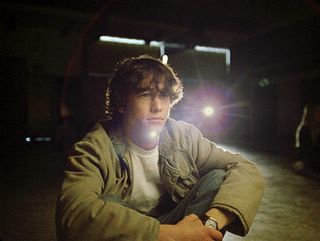
Proof that a clever premise doesn't equal a clever movie, Brick spends far too much time eulogizing a dead genre and not enough time telling a compelling story or developing an original idea. Yes, we all love noir movies. Yes, it's somewhat amusing to dress up Lukas Haas as an old-timey gangster with a cape and a cane and to give him antiquated "criminal" dialogue. But did anyone really think this one-note gimmick was worth developing into a feature? Wouldn't it be possible to tell the same joke, get the same laugh, and then go about constructing a mystery that's interesting on its own merits?
18. Scoop
Atrocious. Woody insults his fans with this movie by churning out such apathetic, transparent piffle. Mass audiences turned their backs on him long ago. He's no longer courting the mainstream. No, when he releases something that so obviously isn't working, a relatively simple comic premise that can't even hold itself together logically, he might as well open and close the movie by facing the camera straight-on and flipping the viewer the bird. Several Woody fans have defended this film to me recently, but to do so requires such rhetorical contortions and diminished expectations, they wind up sounding more dismissive of Woody and his remaining talents than me.
17. An American Haunting
Based around a so-called "true story" from 19th Century New England, An American Haunting features a highly dubious variation on the traditional ghost story. One might almost call it "soul-shatteringly stupid." The combined talents of Donald Sutherland, Sissy Spacek and the esteemed director of Dungeons and Dragons, Courtney Solomon, can't save this hackneyed dreck.
16. Stay Alive
Bring It On launched this obnoxious trend of teen movies with imperative titles. Stay Alive. Step Up. Take the Lead. Stick It. Strap It On 4: Fem Doms.
Hey, you know what? Fuck you. I paid my $10, let's see you idiots step up. I'm going to remain comfortably seated.
Anyway, this braindead teen slasher opens with the question, "What if, when you died in a certain video game, it killed you in reality?" The obvious answer, that you'd stop playing that game, presents an immediate obstacle to ongoing horror movie mayhemn. So the filmmakers devise a ridiculous cheat that invalidates the whole movie: if you stop playing the game, it starts playing for you! Then why not just abandon the stupid "game" concept altogether and just make a movie about a disembodied spirit that thirsts for teen blood?
Also, if star Frankie Muniz wants to be taken seriously as an actor, he should probably go with Frank Muniz. It's a bit tougher, innit? Like Rick Schroeder or Bow Wow.
15. Lucky Number Slevin
"Hey, I know, let's get together a whole bunch of stars and make a crime movie!"
"Okay. What should it be about?"
"Who cares! We're going to get some stars to be in it! Oh, and they should all spout self-aware, pop-culture inspired dialogue all the time, like in a Tarantino movie!"
"Isn't that a bit familiar at this point?"
"The kids will love it! And the best part is, it doesn't even have to make sense, or have any kind of personality of its own! And even the name doesn't have to make sense! Because it will have big stars!"
"Who's going to want to watch this if it doesn't have a personality and it doesn't make sense, and the name is something odd and hard to remember and nonsensical?"
"You know...assholes!"
"Hey, there's millions of them! We'll be rich! You're a genius!"
"I'll go ahead and get Ben Kingsley on the horn. You know he's in."
14. Art School Confidential
Hey, have you ever wondered about all the outrageous, funny stuff that really goes down at art school?
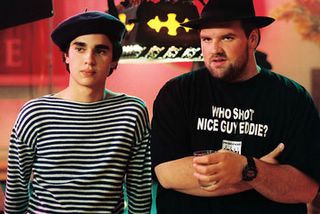
Yeah, me neither. And even if I did, I still wouldn't have liked Terry Zwigoff's and Daniel Clowes' execrable ode to hipster cynicism and Randian egomania. No comedy this pleased with itself could ever have a chance of being funny. Watching it is like helping Donald Trump prepare an acceptance speech just in case he's ever awarded the coveted Nobel Loud, Ostentatious Prick Prize. (Awards banquet hosted by Bill Maher!)
13. Night Watch (Nochnoy Dozor)
Back in 2004, this fantasy-horror epic broke all Russian box office records, becoming the country's most popular film of all time. (Over there, it has already spawned 2 sequels, but only hit American shores in 2006.) The Russian people, post-Eisenstein, and I clearly don't enjoy the same kind of movies. I don't, as a rule, like to watch films that cut between dark, ugly, computer-enhanced images with lightening speed, rendering all on-screen action and characters indiscernable and conferring onto the viewer a massive headache. But, hey, that's me.
There are virtuoso moments here, but they are always simply that - individual moments designed to show off. The camera follows a bolt as it flies off a passing jet and hurtles towards an apartment building at fantastic speeds. It looks impressive (if a bit artificial and "animated"), but belongs in a promo reel or a music video, cause it just breaks the reality and kills the momentum of a film.
12. Date Movie
Date Movie may be the laziest comedy ever made. Plenty of comedies come out that just aren't funny, and some are even what I would consider "creatively bankrupt." That is, they begin with nothing - not even one single genuinely funny set-up or idea. But even in an unfunny, failed comedy (like, say, Scoop), you can usually detect some effort. In fact, that's often what kills a comedy, when you spend enough time not laughing to notice the director, writer and actors trying really hard to make you laugh. This is what typically ruins Kevin Smith movies for me. He's a funny guy, but I always notice him and his actors trying to be funny, which is strange for a dude who's so relaxed and casual in front of an audience on a stage.
But the entire parody genre has become a barren wasteland, a reliable risk-free way to bank on an easy $30 million or so. The films making up this bastard Scary Movie franchise (Epic Movie lands with a thud in 2007) are soulless, empty "products," made without anything approaching craft or effort. Director Aaron Seltzer and writer Jason Friedberg don't even bother mock a wide variety of movies. They pretty much stick to a scene-by-scene recreation of Meet the Parents (already a comedy! and only a mediocre one at that!) with passing references to other recent films. Please note, I said "references," not jokes. For example, Tony Cox plays a character named Hitch based on Will Smith from Hitch. They didn't even bother to make up a fake name to goof on the name Hitch! Even MAD Magazine does that!
11./10. The Wicker Man/The Omen
Neil LaBute's puzzling remake of The Wicker Man indicates a lack of basic understanding about what made the original work. He's taken out all the entertaining stuff (the sex, the camp, Christopher Lee, the satire of sanctimonious religiocity) and replaced it with slack horror movie cliches.
Conversely, John Moore's remake of The Omen hews far too tightly to the Richard Donner original. Why redo a movie at all if you're going to recreate it scene-for-scene, making a few vestigial or ill-conceived changes? Though it's a solid horror film, Donner's original is by no means a flawless, definitive version of this sort of story. Why not try keeping the essential elements but reimagining the actual machanizations of the plot, to keep it fresh for the millions of people who have seen the first film?
I lump these films together both because they are both horror remakes and because they use the same tired, egregiously thin device: supernatural dream sequences that end with a jolt. Not only that, but they botch these scenes in exactly the same way: by letting you know too early that it's all a dream, thus killing any potential suspense that might have built up.
9. Ultraviolet
I don't think it's hyperbole to call this the worst-looking American film of the year. The production company went bankrupt before the effects were completed, explaining the film's awful effects and Playstation cut-scene ambience. But with the guilty party responsible for Equilibrium, Kurt Wimmer, at the helm, this comic-book-style update of a British mini-series never really had a chance.
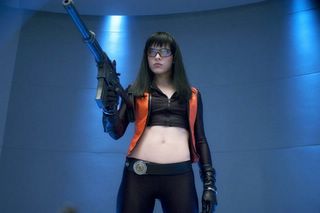
All the Wimmer trademarks from Equilibrium are here - the theatrical, poorly-choreographed fight scenes; the cheesy dialogue; the wooden performances; the '70s camp vision of the future. New to this entry are Milla Jovovich, a long way from her breakthrough in the similarly annoying but far more visionary The Fifth Element, and child actor Cameron Bright, who worked on more bad films this year than Deluxe.
8. Friends With Money
Writer/director Nicole Holofcener and her four leading actresses are all far, far better than this. A navel-gazing, pseudo-comedy about a woman searching for a rich man so she can compete with her bitchy friends, Friends With Money is every bit as offensive as I have just made it sound.
It's not that Holofcener starts with an insulting central conceit or anything. Her movie explores how people can easily detect the problems of others, but lack the ability to self-diagnose until it's too late. Okay, fine. But on her way to an overly pat, tidy conclusion, she fails to create any likable, realistic characters. Significant talents like Frances McDormand and Catherine Keener are saddled with paper-thin, predictable types, while Jennifer Aniston essentially recreates her character from "Friends," only without the great apartment. And the outlook here is just so superficial. Money equals happiness. Poverty is bad when it happens to attractive white women. People who smoke marijuana are loser burnouts. Dating an overweight man is pathetic, unless he's rich, in which case it's acceptable as a last resort. It gives the whole film the feel of late-era James L. Brooks - sappy, elitist, condescending bullshit.
7. Superman Returns
Bryan Singer's turgid, joyless Superman Returns feels more than anything else like a failure of nerve. Rather than risk pissing off long-time fans or young toy purchasers, he essentially reshoots the Donner/Lester classics with modern effects and calls it a day. Okay, that's not entirely fair - he replaces Gene Hackman with a mincing Kevin Spacey, who apparently thought he was starring in a touring production of "Superman on Ice," and he gives the Man of Steel an adorable moppet to take care of. Because we all know how well that worked in Dick Tracy and The Mummy Returns. Singer pulls off a few solid action sequences, and the bright crisp digital photography looks great, but his seriousness of purpose clashes with the inherent goofiness of Superman's world. This overlong, dry retelling of the essential superhero myth puts the "blow" in overblown.
6. The Pink Panther
A remake of a classic comedy is always going to be difficult to pull off, but a remake of one of the most famous comedies in history, boasting the most iconic role from one of the screen's most beloved comedians, might not even be possible. Has any actor ever been more immediately identifiable with a character than Peter Sellers and Inspector Clouseau? Even with a brilliant script and a fresh take on the story, it would be impossible for Steve Martin (particularly at his age) to match Sellers' perfect timing and prodigal talent for physical comedy. Unfortunately, Pink Panther has neither of those things, floundering laugh-free, through a series of predictable set pieces that lack any of the spark or demented genius of Pink Panther Strikes Again or A Shot in the Dark. This one's right down there with that travesty starring Roberto Benigni, which at least had the grace and humility to make its lead Clouseau's son rather than recasting the part.
5. The Da Vinci Code
Ron Howard makes my Worst Films list pretty much every year he makes a film. And with good cause. The guy represents all that is evil about soulless corporate filmmaking. His movies don't simply lack style and originality, they studiously avoid them. Mediocrity is not a bug in Howard's system, it's a feature. He's aiming for maximum gross each and every time, and you don't move units at Wal-Mart by pushing the envelope or subverting expectations. This is why a controversial religious-themed conspiracy thriller represents the worst of all possible subjects for Opie to tackle.
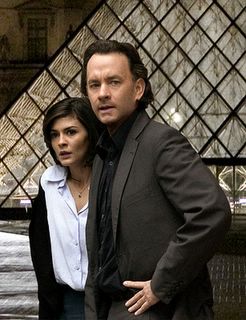
Howard and Ridley Scott should have swapped 2006 projects - Rid could bring his taste for the macabre and his strong visual sense to a twisty Catholic chase movie and Ron could bring his glossy, empty-headed bluster to bucolic shots of Russell Crowe sipping white wine. In fact, it doesn't have to be Ridley Scott. Seann William Scott could have directed a more interesting version of Da Vinci Code than this. I mean, the book is stupid in the first place, but it's at least a quick and painless read. Watching the film's such an ordeal, anyone who gets through it should be nominated for sainthood. I never thought I could hate a movie about an albino assassin who whips himself for absolution, but here we are...
4. Thank You For Smoking
Writer/director Jason Reitman doesn't know much, but he knows he's smarter than you. Not just you, but everybody. Jason's "satire" of the Tobacco Industry uses ridicule as a dodge. He has no perspective on tobacco one way or the other. It's bad for people, sure, and the companies that produce it will use any means necessary to ensure that they get to keep selling it for profit. Other than that, he's got nothin'. (And as the film is based on a novel by Christopher Buckley, one can only assume that he's also got nothin'.)
So in place of insight, the film's filled with wall-to-wall snark and bile. Reitman presents lame caricatures and strawmen - the overeager girl reporter, the ludicrous New Age movie executive, the shamelessly self-promoting politician - and then takes great delight in tearing them down, as if mocking clueless Senators and shallow film industry types requires any kind of skill. Throw in a couple of gooey, faux-heartwarming scenes on loan from Jerry Maguire and you've got a recipie for the year's most smug, unlikable indie hit.
Perhaps festival crowds felt flattered by the film - they were in on the joke, laughing along with Reitman at all the stupid Americans who aren't sophisticated insiders, already cynical about everything they see, hear and read. I found the film's callousness and air of elitist superiority decidedly off-putting.
3. Nacho Libre
When I first saw this reprehensible Jack Black "comedy" in June, I was certain it would be the worst film released in 2006. The fact that not one but TWO films would top it indicates just how woeful a year this really was for American film. Anyway, in the comments to my original review, a lot of people have objected to my characterizing the film as "racist."
So I'd just like to reiterate that characterization and explain myself further. Nacho Libre is racist because it presents a singular, and inaccurate, view of Mexicans and their nation as subordinate and inferior to the whites who made the film. Mexico is an extremely diverse country, both culturally and geographically. But in this film, it is uniformly brown, ugly and despoiled, and filled with stupid, ugly peasants. (Pretty much everything about Mexicans, from their cuisine to their music to their physical appearance, is mocked during the course of the film.)
Napoleon Dynamite director Jared Hess either finds the mere appearance of Mexicans to be inherently funny or simply could not derive any other kind of humor from his thin, sophomoric premise. The idea of Jack Black playing a Mexican wrestler is funny, but nothing in the movie truly capitalizes on this idea, or even approaches it on anything but the most superficial level. Black's character is theoretically funny because he looks ridiculous in a wrestler's outfit. No further attempt is made to endear him to the audience or invest him with any kind of inner life or soul, basic requirements for any comic protagonist.
Instead, Hess mines for the inherent comedy in overstated Mexican accents, obese children and old people with missing teeth. I liked his low-budget debut, but I'm wondering whether or not Hess will even get a chance to direct another movie after this Braffsterpiece.*
2. United 93
My case against United 93 is long and involved. I suggest you go here to the original review to get a clear idea of why I hate this movie the way that I do. It's possible that my least favorite (or second-least-favorite) movie of the year will win the Best Picture Oscar two years running. (Last year's winner, Crash, being my Worst Film choice for 2005.)
Watching Paul Greengrass' film is like reading Osama bin Laden's resume. Like the Worst's Most Fearsome Terrorist Mastermind, Greengrass is using 9/11 to demonstrate his own technical prowess. (George W. Bush prefers to use 9/11 to demonstrate his expansive penis size.) Accordingly, he never allows the event itself to intrude on his recreation. This is a film about nothing except Paul Greengrass' ability to accurately depict. It is a black hole of history - real events disappear within Greengrass' fictional patchwork, becoming nothing more than disconnected images, scenery for him to shoot.
Just ask yourself - why recreate 9/11 on film? United 93 doesn't tell a story about that day, something inspirational, tragic or otherwise. This is not World Trade Center, a well-meaning if occasionally misguided depiction of the heroism exhibited by rescue teams on 9/11. Instead, it's an exercize, as disturbingly cold and inhuman as any film I have ever seen, like a film directed by a moviemaking robot that has been given instructions to "put 9/11 to film." The argument that it's exceedingly well-made does nothing to convince me of its value, any more than a really expertly-crafted electric chair or a custom-engineered new strain of SuperAIDS.
1. Lady in the Water**
Earlier this year, before Lady in the Water hit theaters, I won a contest by submitting the most creative guess as to how the film would end. Here was my guess:
Okay, so obviously, we know that M. Night will eventually get around to revealing that "it's all a story," possibly being read by Cleveland to a little girl or some crap like that. I'm thinking he might take the notion one step further this time, sensing that everyone's catching on to his little tricks. Soooo....
We pull back to reveal Cleveland reading the entire film's plot, as a bedtime story, to a little girl.
THEN
We pull back to reveal Peter Falk from "The Princess Bride," reading the film's plot as a bedtime story to Cleveland
THEN
We pull back to reveal M. Night Shyamalan reading the film's plot as a bedtime story to Peter Falk
THEN
We pull back to reveal God reading the film's plot to M. Night Shyamalan
Because, let's face it...The guy's divinely inspired.
I was joking, but it turns out that I was right! Not about the whole movie being a bedtime story (although that's not too far off), but about Night believing himself to be divinely inspired. That's pretty much the whole point of the movie - the writer Night plays himself is told by an angelic figure that his work will inspire generations and change the world for the better.
I'm not sure if any other filmmaker in history has made a movie that's this egomaniacal. (Though the more I think about INLAND EMPIRE, the more I think the entire final scene is set inside David Lynch's brain.) The only other way to even come close would be to use special effects to 69 yourself on screen. I think the image of a director and his clone blowing one another might edge out Lady in the Water in terms of self-love, but it's hard to say without actually seeing something like that.
On top of that, it's just boring and poorly put together. Once upon a time, Shyamalan demonstrated a precocious, natural ability to frame shots, build suspense and write characters. He fumbles around this half-formed narrative like a rank amateur, frequently inserting long expositional monologues where they don't belong and repeating himself endlessly. And the special effects on the film's villainous wolves come in just after Ultraviolet as the spottiest of the year. They look like cartoons chasing after Paul Giamatti, not real wolves made of branches. (Yeah, they're supposed to look like wolves made of branches...I didn't pick it as the Year's Worst Film on a whim...)
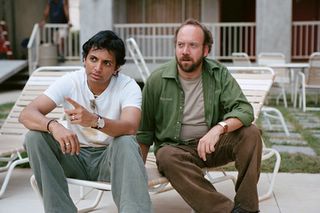
Night's film is the perfect metaphor for 2006. So enraptured of itself, so invested in its own power and ability, the movie forgets to actually entertain, to do anything that fantastical bedtime stories stories are supposed to do. Like our nation's foreign and environmental policy, it's centered around an essential delusion: George Bush and Night know what they are doing and have it all under control. (Night and Bush also share the same phony, dewy-eyed, mock spirituality, when they clearly know nothing of the humility and reverence for all human life preached by religion.)
The thing is, Bush hasn't a clue about how to do anything but cover his own ass, and Night has lost whatever ability he previously had to make films or judge his own work. I've heard better bedtime stories from Glenn Danzig.
*Braffsterpiece: (1) Any film that, in some way, resembles the work of writer/director Zach Braff, (2) a horrible film, (3) a nickname for Braff's debut film, Garden State.
**A special award goes to Guy Ritchie's Revolver, the worst movie I actually saw in 2006. Unfortunately, it is so bad, no one will release it in America, making it ineligible for an actual spot on the list.

